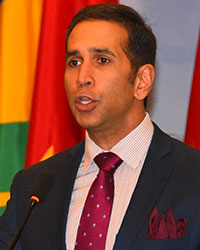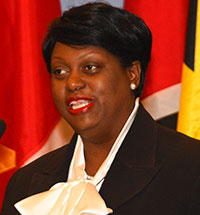EXECUTIVE Secretary of the Financial Action Task Force (FATF), David Lewis on Wednesday noted that despite efforts to combat the threats posed by money laundering, terrorist financing and proliferation financing, these criminal activities are on the rise.

He noted that if FATF’s recommended measures are implemented effectively, then economies would be protected and their competitiveness increased. He noted too that regional countries would be in a better position to attract foreign direct investment, thereby giving each country a boost and deeming them good and safe to do business.
Speaking at the opening ceremony of the Caribbean Financial Action Task Force’s (CFATF) 46th plenary and working group meeting held at the Marriott Hotel, Georgetown, Lewis lauded the efforts of CFATF despite the many challenges it faced over the past few months, including the devastations which occurred as a result of Hurricanes Irma and Maria.
He said too that meaningful engagement, collaboration and effective communication with the criminal justice service is necessary in detecting criminal activity, terrorism and the attempted misuse of the financial system. FATF, through the global network, is reaching out to the prosecutorial services and criminal justice systems of FATF members to draw

attention to the intricate structures used for legal and illegal activities. The financial body is also seeking to highlight the growing nexus between organised crime and terrorism, to raise awareness with national authorities and the private sector.
“The FATF presidency recognises that the legitimacy of global AML/CFT efforts rest not only in effective prevention but in convictions, sanctions, freezing, confiscation and assets recovery for the benefits of both states and victims,” Lewis said as he called on CFATF to maintain its participation in its joint endeavours with FATF and gave assurances that the FATF is committed to supporting and working with the regional organisation.
Strengthened membership
Meanwhile, outgoing Chairperson of the CFATF and Attorney General of the Turks and Caicos Islands, Rhondalee Braithwaite-Knowles stressed the importance of strengthening CFATF’s membership. For her part, Braithwaite-Knowles commended Guyana for its work and noted that it is ready to accept the baton of leadership. She said Guyana has the unanimous support of the Council of Ministers and pointed to the serious responsibility of spearheading the regional strategy to combat money laundering, the financing of terrorism, and the proliferation of financing of weapons over the next year.
“We are not going anywhere; we are going to be here (Trinidad and Tobago and Turks and Caicos Islands) to provide steady support to Guyana and Barbados as they take the helm,” said the CFATF Chair who said that during her one-year tenure, the focus was on institutional building and governance strengthening of the institution’s membership. Since its creation in 1992, she said CFATF’s 25 member states have fully embraced their international obligations as signatories to the varying conventions in pursuit of the wider goal of protecting the wider financial system from criminal activity.
“Over the years, we have had to confront the challenges of complying with the international standards and in many cases, have endured the harsh criticisms…of having weak anti-money laundering and combatting the financing of terrorism regimes which pose threats to the international system,” said Braithwaite-Knowles.
She said too that the impact of same on small and developing economies like the Region’s have been negative. “These have had significant implications for our small and fragile economies, yet we were not daunted, we put our shoulders to the task,” the CFATF Chair said, noting that by 2013 the body was hailed as one of the best.
That aside, she recapped the many successes of CFATF, including its EURO 3M programme for the training of financial investigators and analysts, which she described as “unique” globally. Similarly, immediate past president of CFATF–Attorney General and Minister of Legal Affairs of Trinidad and Tobago–Faris Al- Rawi said CFATF is in a better position now than it was three years ago and called on the membership to remain committed to their obligations under CFATF and FATF.
“Collective advocacy is required in our grouping to educate, inform and sometimes push back against sharp practices,” Al-Rawi said as he warned that there are real consequences to inaction. He encouraged the CFATF “to gel in a more meaningful sense”. “If jurisdictions don’t come together to participate, we’re going to be denying ourselves the opportunity to be forewarned and therefore forearmed. We’re going to be denying our opportunity for growth in the jurisdictional and assessor experience and we’re going to miss the opportunity to be intimately informed and aware of the real issues,” AG Al-Rawi stressed.



.jpg)








